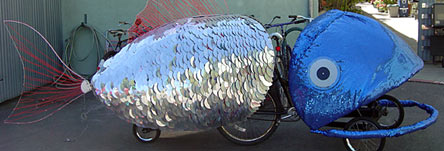Assessing The Environmental Cost of the Record Business
Posted by Justin Boland on Feb 29, 2008 | 0 Comments
 Exclaim!, the long-running and very much badass Canadian music magazine, recently published an article, How to Save the Planet (One Gig at a Time). I read articles I disagree with several times a day, but I think this is one worth exploring, because it’s a good gateway to every single issue this article is going to touch on.
Exclaim!, the long-running and very much badass Canadian music magazine, recently published an article, How to Save the Planet (One Gig at a Time). I read articles I disagree with several times a day, but I think this is one worth exploring, because it’s a good gateway to every single issue this article is going to touch on.
Let’s start with the first paragraph of the article:
A recent report in the U.K. Guardian claims that one million unsold copies of Robbie Williams’ last CD Rudebox will be shipped to China to be crushed (and hopefully used for road-surfacing). Dealing with product waste like this reportedly costs EMI millions of dollars a year.
Nobody in China is That Stupid

Aside from imperial wars and Wall Street arrogance, there’s another reason the US is losing it’s superpower status to China: they’re really good at making money. I would suggest that it’s very naive to think 1 million unopened copies of a western pop album will get destroyed when they could simply get sold. They’re worth more as CDs than they are as small, granular chunks of crushed plastic.
Piracy and theft are the bedrock foundation of the Chinese economy, and this extends from technology to clothing to the record stores. For anyone who missed it, a great author named Ed Peto recently gave an incredible analysis of the music industry in China for UK website The Register.
md5-ab61ccba67cf9a78710b6df7ddd644c9 md5-efc9c582aced425d191e49f2041c8224
The arrival of western product in the early 90s came courtesy of “saw-gashed’ CDs: Excess stock and deleted titles from western majors attempting to avoid taxation and disposal costs. These CDs had their cases cut to mark them as defective and were then shipped in to China through free-market economic ports like Guangzhou, only to end up on the black market. An end result that can be seen as a partial “shooting-in-the-foot’ for the western majors who then had to come in and fight against the pirate networks they inadvertently helped set up.
Don’t Get Me Wrong
md5-5c965c530bca90161b82719a582e6dc0 md5-a75733088dfa34b747912075f4346733 md5-879330b3927f1de248f5b063e928264b md5-bc4d6b956c4be5afd056a793f624de2c md5-3ee100b1937b7b431c766a380205cb36Now, musicians are some of the most disorganized people I know. You have to badger them for the rehearsal space rent. Who knows where their copy of the record deal is, let alone all those gas receipts at tax time. Hell, half of them barely remember to bring a guitar pick to a gig.
Makes me glad I do hip hop.
Thinking back to when I played bass and thought I was a punk singer, though, I have to disagree. I’ve played in bands more or less non-stop since I was just getting used to high school, and perhaps I’m just lucky. The musicians I have known and worked with have been driven, creative, and very successful people. In fact, most of them inspired me to get my ass organized, focused and professional.
Now, doing hip hop, I’m meeting rappers who know more about the demographics of hip hop than major label executives do. Everywhere I go, I keep crossing paths with young men and women who put in 18 hour days, for months on end. Hip hop right now is like Silicon Valley in the early 90s. I don’t think that’s hyperbole-just look at where all of the innovation in the music industry has been coming from. The most aggressive and experimental entrepreneurs in the industry are working in hip hop. Everyone else is just taking notes.
What is the Scope of the Problem?

Even if “destroyed” CDs in China wind up back on the market, I’m not denying people throw out CDs. I’ve junked several thousand myself.
It’s hard to find precise figures about the environmental cost of CD manufacturing. (Shocker.) I did find a few general facts from the very helpful (and nicely designed) CD Recycling Center:
In 1983, when CDs were introduced in the United States, 800,000 discs were sold. By 1990, this number had grown to close to 1 billion!
md5-10f76963016d7e115df405ff44a5a778 md5-8cf04c62db616529fd13d788fa4d50e0Will the Problem Solve Itself?
md5-044b8820854f846f15d36680f94df40dIN 2006 EMI, the world’s fourth-biggest recorded-music company, invited some teenagers into its headquarters in London to talk to its top managers about their listening habits. At the end of the session the EMI bosses thanked them for their comments and told them to help themselves to a big pile of CDs sitting on a table. But none of the teens took any of the CDs, even though they were free. “That was the moment we realised the game was completely up,” says a person who was there.
Then again…check out today’s Listening Post coverage of the Digital Music Forum East conference. Thomas Hesse, from Sony/BMG:
I have an upbeat view on physical. I don’t think the CD is dead at all. It’s a different shift, CD to digital than vinyl to CD, which was a clean break. In today’s world, not everyone is going online. 70 percent of US online. 75 percent in a few years. Online penetration growth is small. How is this 30 percent that is offline going to get music? We have some physical retailers who are excited about the contraction, and growing their business in a meaningful way.
md5-ca3fb839e4f5f055fec2a4098ae7e405 md5-d95c39a3ea20b1166bf83f0c2ba06b8bAre you operating on the assumption that the CD will remain an important format?
md5-5ca7ee4b7926fb1e15b2c556c8bcd86eTHE BOTTOM LINE IS LOCATED INSIDE YOUR WALLET
md5-becd5524f8f0aaa1170f841a23d26fbd md5-0d8341bab6e1e2b64a4ca581c71d27fc md5-996a5fdd2b090f0582c972566d0f21ee…we put our heads together and worked on whether maybe, just maybe, there’s a way to make use of the millions and millions of water and soda bottles that are thrown out every day by consumers. After brainstorming together we zeroed in on a new way to create a Digipak tray out of nothing other than bottles that were being destined for the landfill or incinerator.
One Last Question
I wrote this simply because it interested me and I chose to pursue it. I’m also tempted to work on an article examining what I didn’t cover here-namely, the environmental impact of touring. More importantly, though, I don’t want to be self-indulgent. I want to know what the Audible Hype readers think about this-is this a line of inquiry you care about, or was this wandering down the wrong alley? Thanks in advance, folks…and as always, thank you for your time.

